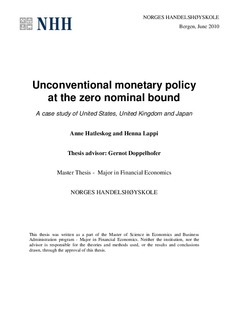Unconventional monetary policy at the zero nominal bound : a case study of United States, United Kingdom and Japan
Master thesis
Permanent lenke
http://hdl.handle.net/11250/168673Utgivelsesdato
2010Metadata
Vis full innførselSamlinger
- Master Thesis [4372]
Sammendrag
The objective of this paper is to assess unconventional monetary policy at the zero nominal bound: First, we assemble a framework for implementing and evaluating unconventional monetary policy. Second, we use the framework to conduct three detailed case studies on unconventional policy responses in Japan, United States and United Kingdom. Third, we make a cross-country analysis of the development in key macroeconomic variables after the adaption of unconventional monetary policies.
We find that unconventional monetary policy responses by the Federal Reserve Bank of the United States and the Bank of England during the financial crisis of 2007-09 have succeeded to a greater extent in fighting deflationary pressures than earlier unconventional policies by the Bank of Japan.
Our analysis suggests that unconventional monetary policy responses should be adapted to the particular circumstances in each country to have their full effect. In addition, unconventional policy should be pre-emptive, timely and aggressive in order to signal a credible commitment from the central bank. However, there is great uncertainty about the effect of unconventional monetary policy at the zero nominal bound and policymakers cannot fine-tune their response.
Structural factors in the economy may be a hindrance for the effect of unconventional monetary policy. In particular, we find that financial sector structural problems need to be addressed, but that this is not necessarily a task for central banks. Further on, we argue that unconventional policy responses beyond the traditional role of central banks should be considered carefully in the future, as this may threaten central bank independence in the long run.
